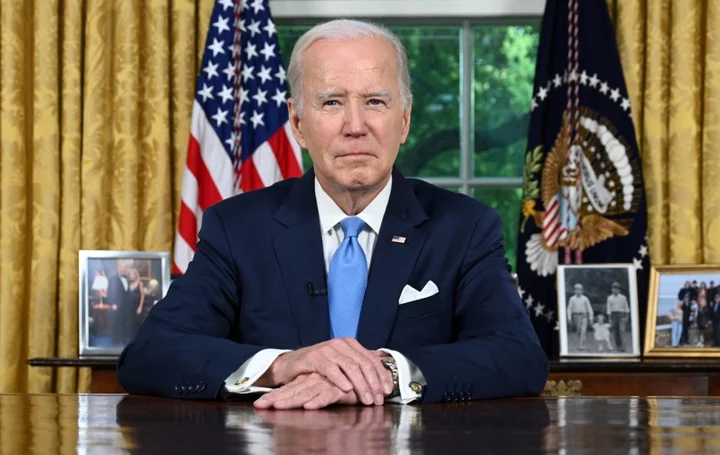
Biden calls for national unity as he hails debt limit agreement in Oval Office address
President Joe Biden on Friday urged Americans not to give up on working across the political aisle to solve national problems as he hailed the bipartisan legislation passed by Congress to stave off a catastrophic default on the nation’s sovereign debt as a good compromise that will protect the economic progress of the past two years. Speaking from the Oval Office during the prime-time television viewing hours — the first time he has addressed the nation from behind the iconic desk hewed from timbers taken from HMS Resolute — Mr Biden said he’d chosen to speak to the American people that night to “report on a crisis averted” and explain what his administration and Congress “are doing to protect America’s future” by enacting the spending agreement negotiated between his aides and top House Republicans. The president said he would sign the legislation on Saturday. “Passing this budget agreement was critical. The stakes could not have been higher,” he said, just moments after he told Americans that the goals of the agreement — “keeping the full, faith, and credit of the United States” and enacting “a budget that continues to grow our economy and reflects our values as a nation” – are “essential” to continuing the progress made during the first two years of his presidency. The president said “nothing” would have been more irresponsible or catastrophic than a failure by the US to pay its bills and laid out the dire consequences that a default would’ve brought on Americans of all stripes. “Our economy would have been thrown in recession. Retirement accounts for millions of Americans would have been decimated, eight million Americans would have lost their jobs. Default would have destroyed our nation’s credit rating, which would have made everything from mortgages to car loans to funding for the government much more expensive and it would have taken years to climb out of that hole — and America standing as the most trusted, reliable financial partner in the world would have been shattered,” he said. While Mr Biden said it was “critical” to reach the agreement he will sign into law and called it “good news for the American people,” he also stressed the necessity of compromise given the realities of Republican control of the House of Representatives and the thin one-seat majority by which his own party controls the Senate, as well as the importance of provisions in the bill that will ensure key social programmes will receive full funding in the next two years. “No one got everything they wanted but the American people got what they needed. We averted an economic crisis and an economic collapse,” he said. “We’re cutting spending and bringing deficits down. And, we protected important priorities from Social Security to Medicare to Medicaid to veterans to our transformational investments in infrastructure and clean energy.” He also touted the fact that the agreement preserved legislation like the PACT Act– which extends veteran benefits to service members who suffered health complications from burn pits – and the Inflation Reduction Act, as well as the CHIPS and Science Act, which promotes manufacturing of semiconductors in the United States. “Remember at the beginning of this debate, some of my Republican colleagues are determined to get the clean energy investments,” he said. “I said no, we kept them all.” Mr Biden’s remarks came less than 24 hours after the Senate approved the compromise bill by a margin of 63-36, and just over two days after the House of Representatives voted to advance the legislation. They represent the most extensive public comments the president has made on the now-resolved crisis after weeks of silence from the White House. Many in the president’s own party had criticised his reluctance to inject himself into the public discourse surrounding the negotiations. But a source close to the White House end of the process told The Independent on Thursday that Mr Biden’s silence was a deliberate choice, made out of necessity to avoid inflaming Republicans who would need to vote for the legislation to avert what most experts say would have been a worldwide economic disaster brought on by a US debt default. In the end, Mr Biden’s strategy proved successful in preventing Republican opposition from sinking the 11th-hour deal to save the US and world economies, and the White House was able to cajole all but a limited number of Democrats to give their support as well. Of the 51 members of the Senate Democratic caucus, just five joined 31 Republicans in opposition to the measure, which will suspend the nation’s statutory debt limit through the entirety of the 2024 election cycle while implementing limited spending cuts sought by the GOP and enacting some work requirements for non-disabled adults without children between the ages of 50 and 54 to access the Supplemental Nutrition Assistance Program, otherwise known as SNAP and formerly known as food stamps. A number of arch-conservatives in the House of Representatives had criticised the bill as giving away far too much to the White House, and in the end 71 members of the GOP conference voted against it, necessitating Democrats to contribute enough support to pass the GOP-controlled chamber. The bipartisan legislation, which was unveiled earlier this week following marathon negotiations between the White House and the Republican-led House of Representatives, will be signed into law with just two days remaining before the 5 June “X Date,” the day on which Treasury Secretary Janet Yellen had projected that the government would exhaust its ability to pay its outstanding debt obligations absent intervention from Congress. The spending and debt ceiling deal is the first major bipartisan agreement between the White House and the House since Mr McCarthy was elected Speaker after a record 15 ballots in January. The president had for months pledged not to negotiate while the GOP held out the possibility of a default as leverage to force him to endorse rolling back much of the legislative accomplishments enacted during his first two years in office, while Mr McCarthy had committed not to allow any bill that would lift the debt limit to move through his chamber absent concessions from the White House. The impasse persisted for months until Mr Biden extended an invitation to Mr McCarthy after the House passed what the GOP dubbed the “Limit, Save, Grow Act” — a bill to lift the debt ceiling and enact massive cuts to government programmes. Negotiations kicked into high gear late last month after the president tapped Shalanda Young, the director of the Office of Management and Budget, and Counsellor to the President Steve Ricchetti — one of his longest-serving and most trusted aides — to engage with two GOP House members chosen by Mr McCarthy, House Financial Services Committee Chair Patrick McHenry and Louisiana Representative Garret Graves. The president praised House Speaker Kevin McCarthy, as well as Senate Majority Leader Chuck Schumer, Senate Minority Leader Mitch McConnell and House Minority Leader Hakeem Jeffries for undertaking good-faith efforts to move the bill through their respective chambers with deliberate speed. “They acted responsibly and put the good of the country ahead of politics,” he said. “A final vote in both chambers was overwhelming.” He closed his address by emphasizing unity and the importance of “see[ing] each other’s not as adversaries but as fellow Americans” and “treat[ing] each other with dignity and respect” as a way to “lower the temperature” so both parties can “work together ... to pursue progress, secure prosperity and keep the promise of America for everybody”. “I know bipartisanship is hard, and unity is hard, but we can never stop trying because in moments like this one, the ones we just faced, where the American economy in the world economy is at risk of collapsing,” he said. “There’s no other way. With reporting from Andrew Feinberg in New Hampshire and from Eric Garcia in Washington Read More Senate passes debt limit bill after marathon 11 amendment votes to avoid default Angry progressives and conservatives hit out as Democrats push through Biden-McCarthy debt ceiling deal FBI offers to show GOP chairman document that purports to relate to Biden, his family Republicans schedule 1st presidential debate for Aug. 23, but there's no guarantee Trump will attend DeSantis wraps up 1st early states tour as candidate with more personal touch in South Carolina
2023-06-03 07:58
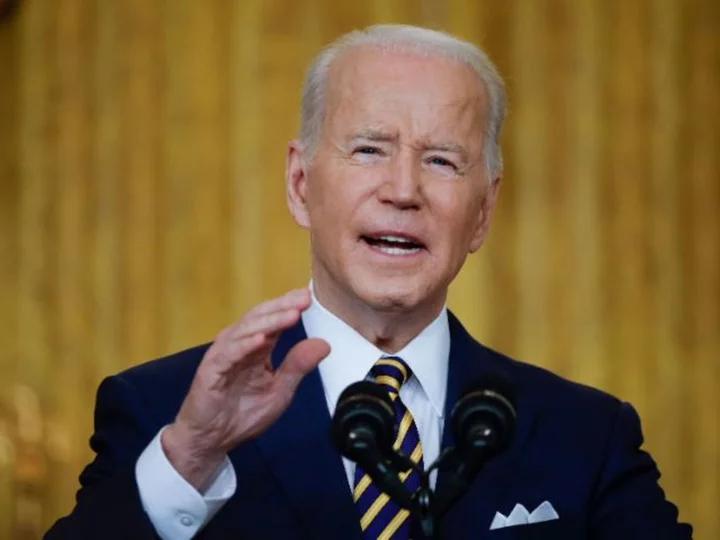
Biden to address nation from Oval Office after avoiding catastrophic default
President Joe Biden will address the nation from the Oval Office on Friday evening -- his first time speaking to the country directly from that setting -- following congressional passage of a compromise measure that raises the federal borrowing limit and avoids a catastrophic default.
2023-06-02 23:24
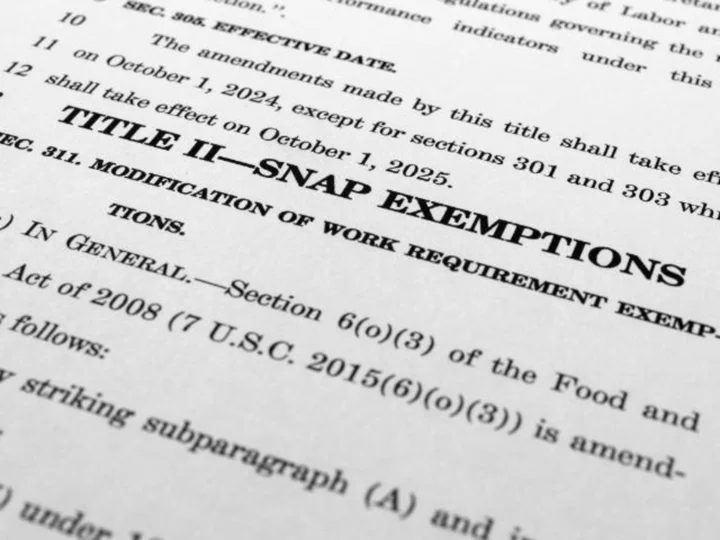
Here's who would have to work for government benefits -- and who wouldn't -- under the debt ceiling package
Work requirements in two safety net programs for low-income Americans are set to change under the compromise debt ceiling package negotiated by President Joe Biden and House Speaker Kevin McCarthy.
2023-06-02 23:19
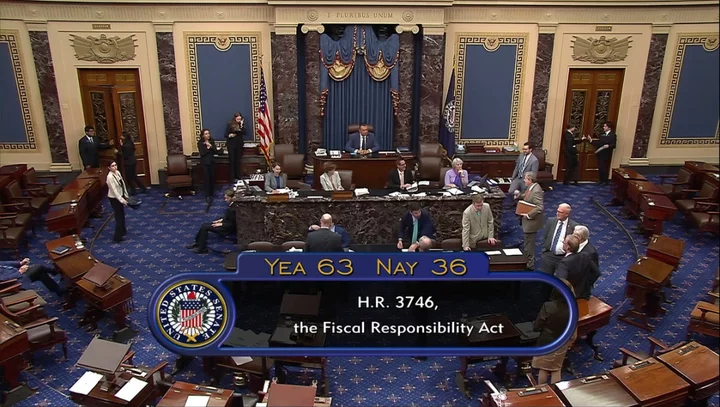
Debt ceiling news - live: Senate passes debt limit deal bill sending it to White House for Biden signature
The Senate has passed a bipartisan agreement forged by US president Joe Biden and House speaker Kevin McCarthy to raise the $31.4 trillion US debt ceiling after the deal survived a Republican rebellion in the House of Representatives. The Fiscal Responsibility Act, which will also implement new federal spending cuts, cleared the lower chamber with 314 votes in favour and 117 against on Wednesday night. The narrowness of its passage through the House was made possible through the support of Democrats, who stepped in to thwart a Republican rebellion that badly undermined Speaker McCarthy’s claims to control over his increasingly divided party. On Thursday, the Senate rejected 11 proposed amendments before passing the bill 63 for to 36 against. Senate majority leader Chuck Schumer will now send the bill to President Biden’s desk for his signature. Full congressional approval was required before Monday 5 June, when the Treasury Department was expected to run out of funds to pay its debts for the first time in American history. Read More Underestimated McCarthy emerges from debt deal empowered as speaker, still threatened by far right Lauren Boebert didn’t turn up to vote on debt ceiling deal she furiously campaigned against What’s next for Biden-McCarthy debt ceiling deal as Senate races to beat default deadline?
2023-06-02 16:18
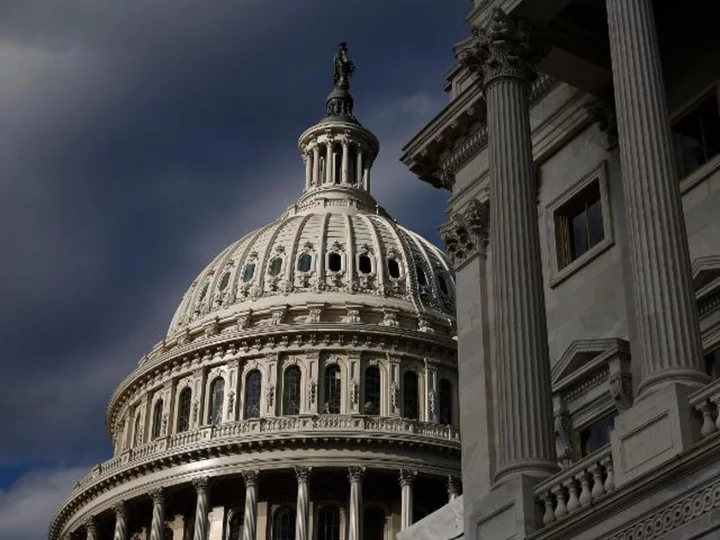
Here's what's in the debt ceiling package
Congress has passed the debt ceiling package, just days before the Treasury Department would have run out of sufficient funds to pay all of the nation's obligations on time and in full.
2023-06-02 11:27
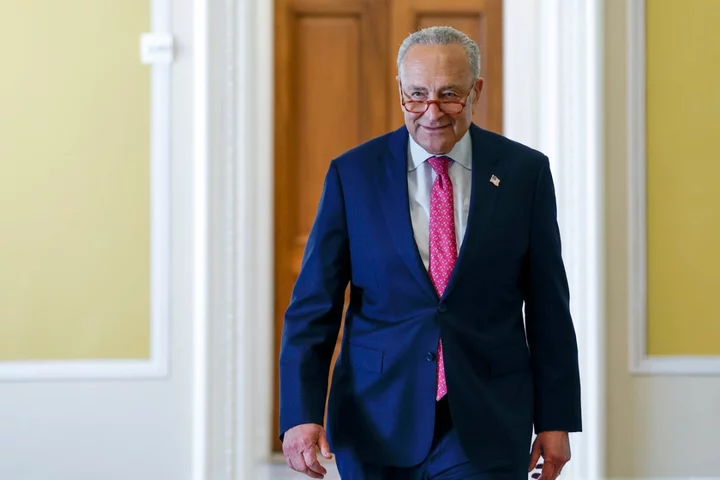
Senate passes debt limit bill after marathon 11 amendment votes to avoid default
The Senate voted late on Thursday night to raise the debt limit and avoid allowing the United States to default on its debt for the first time in history after having an all-night marathon session of votes to assuage Republican concerns. The legislation passed 63 to 36 after senators held 11 votes on amendments —10 from Republicans and 1 from Democrats — to address concerns about the bill. All but five Senators in the Democratic caucus--Sens Bernie Sanders (I-VT), Elizabeth Warren (D-MA), Ed Markey (D-MA), John Fetterman (D-PA) and Jeff Merkley (D-OR)--voted for the legislation while 31 Republican Senators opposed it. “America can breathe a sigh of relief because in this process we are avoiding,” Senate Majority Leader Chuck Schumer said before the votes began on Thursday evening. The vote came after the House passed the legislation on Wednesday that was the result of bipartisan negotiations between the House and the White House. The bill will now head to President before 5 June, the date that Treasury Secretary Janet Yellen had warned that the United States would default on its debt. Republicans raised concerns about some of the restraints on defence spending, which is capped at $886bn. “Well, my message is, I'm a Reagan Republican,” Sen Lindsey Graham (R-SC) told The Independent. “And you do military budgets based on threats and you want to fight over the role of the Republican Party on national defence, I welcome the fight.” Mr Graham expressed concern that it would lead to the United States not being able to support Ukraine in its war against Russia. “And if you want to avoid conflict, you better stand up to aggression,” he said. Sen Susan Collins (R-ME) echoed those concerns in a floor speech. “It would trigger an automatic meat an indiscriminate across-the-board cut in our already inadequate defence budget and in the domestic discretionary non-defence funding,” Sen Susan Collins (R-ME) said in a floor speech. “This would happen automatically if in fact all 12 appropriations bills have not been passed.” Ms Collins said that such a problem could be remedied through a defence supplemental package, which other Senators have also discussed. “It was important for some of our members to have folks on the record, acknowledging that there clearly could be a need will be a need for additional assistance for our national security interests,” Senate Minority Whip John Thune (R-SD) told The Independent. But some Republicans said they still opposed the debt limit increase. “Trade deficit with China,” Sen Josh Hawley (R-MO) told The Independent about why he opposed the bill. “Not gonna do anything about it.” Before the votes began, the Senate went into overtime with negotiations, with Sen Kyrsten Sinema (I-AZ) serving as an intermediary between Democrats and Republicans. “The President took too long but he had his own process and we got to save the country from having to fall,” Sen Mitt Romney (R-UT) told The Independent. “Speaker McCarthy has been underestimated and he's proven that he could get something done.” Conversely, Sen Tim Kaine (D-VA) proposed an amendment to strike a provision to expedite the completion of the Mountain Valley Pipeline, a natural gas pipeline that spans from West Virginia to Virginia, that ultimately failed 30 to 69. The pipeline is a top priority for Sen Joe Manchin (D-WV). Mr Manchin celebrated the inclusion of the pipeline in the agreement. “It’s important for our country, very much important,” Mr Manchin told The Independent. The approval of the pipeline triggered Sen Ed Markey (D-MA), an outspoken advocate for combating climate change, from opposing the legislation. But Sen Brian Schatz (D-HI), another climate hawk, said he would vote for it. “The agreement is the agreement we're going to have to vote for it,” he told The Independent. Other Democrats criticised the fact the bill imposed work requirements for the Supplemental Nutrition Assistance Program, known as SNAP and formerly called food stamps, for adults between the ages of 50 and 54 who do not have children and do not have disabilities. “I did not agree to these SNAP restrictions, and I won’t give Republicans an opening to try and take food from more food insecure Americans in Farm Bill negotiations later this year,” Mr Fetterman said in a statement after the vote. “As I communicated to leadership and the White House, I would have voted to avoid default if it would have made the difference. All in all, this was a tough vote and an ugly situation manufactured by extortionists. While we avoided a catastrophe this time around, we should never put the country in this situation again.” Mr Fetterman said Mr Biden should have invoked the 14th amendment to the US Constitution to avoid a default on the nation’s debt. The vote signals the end to a drawn-out fight between the Republican-controlled House on one end and a Democratic-controlled Senate and the White House on the other. Mr Schumer said the quick passage of the legislation showed the willingness to the Senate to avoid a catastrophic default. Read More 'Shrink the room:' How Biden and McCarthy struck a debt-limit deal and staved off a catastrophe Underestimated McCarthy emerges from debt deal empowered as speaker, still threatened by far right Biden and McCarthy’s debt limit deal went through – but there are winners and losers 'Shrink the room:' How Biden and McCarthy struck a debt-limit deal and staved off a catastrophe Biden and McCarthy’s debt limit deal went through – but there are winners and losers What’s next for Biden-McCarthy debt limit deal as Senate races to beat default?
2023-06-02 11:17

Senate passes bill to block Biden's student loan forgiveness program
Both the Senate and the House have now passed a bill to block President Joe Biden's student loan forgiveness program, which promises to cancel up to $20,000 of debt for millions of borrowers but has been held up by courts.
2023-06-02 02:55
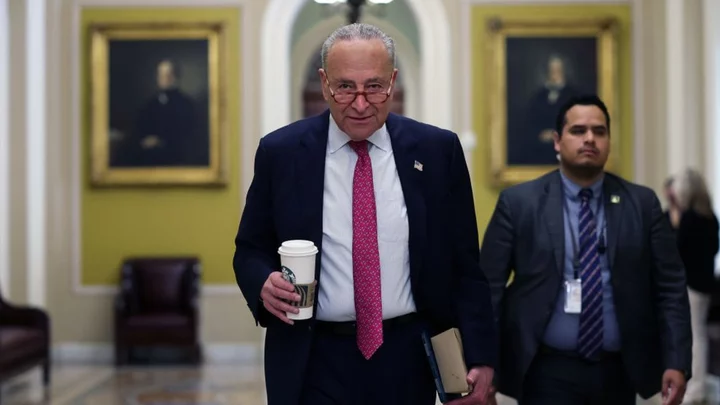
Debt ceiling deal heads to US Senate for approval
The Senate must approve the deal and send it to the president's desk this weekend to avoid a default.
2023-06-02 00:28
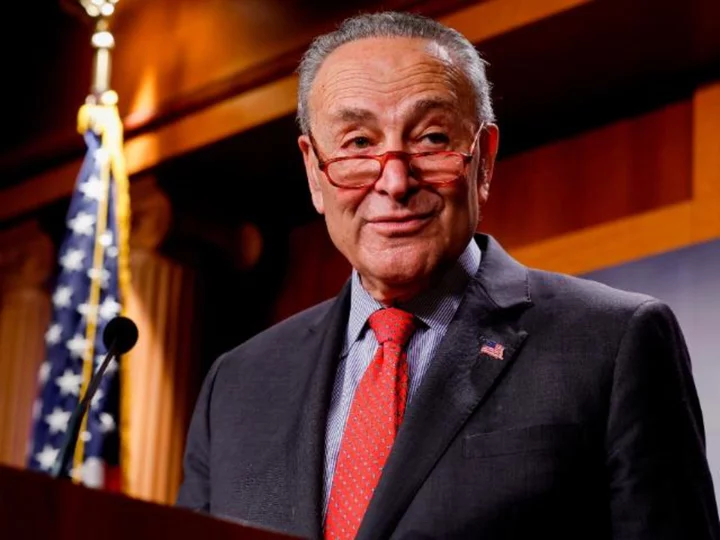
Senate races to avert default but vote timing unclear for debt limit bill
Senators are racing the clock to pass a bill to to suspend the nation's debt limit through January 1, 2025 -- but it's not yet clear when a final vote will take place as the threat of default looms.
2023-06-01 17:25
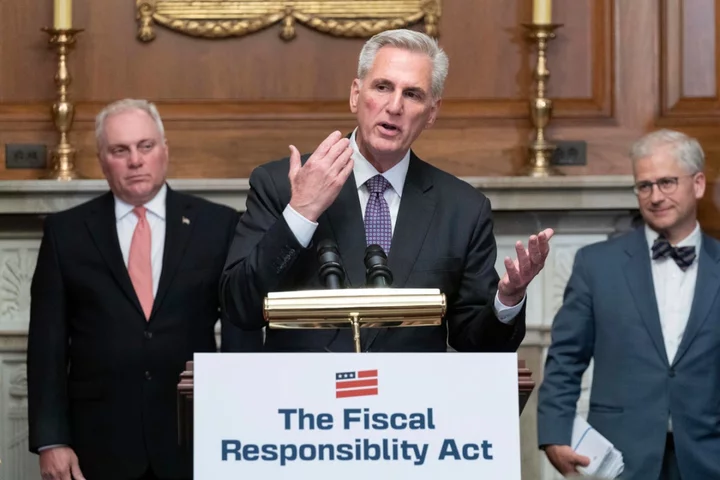
After sailing though House on bipartisan vote, Biden-McCarthy debt ceiling deal now goes to Senate
Veering away from a default crisis, the House overwhelmingly approved a debt ceiling and budget cuts package, sending the deal that President Joe Biden and Speaker Kevin McCarthy negotiated to the Senate for swift passage in a matter of days, before a fast-approaching deadline. The hard-fought compromise pleased few, but lawmakers assessed it was better than the alternative — a devastating economic upheaval if Congress failed to act. Tensions ran high as hard-right Republicans refused the deal, but Biden and McCarthy assembled a bipartisan coalition to push to passage on a robust 314-117 vote late Wednesday. “We did pretty dang good,” McCarthy, R-Calif., said afterward. Amid deep discontent from Republicans who said the spending restrictions did not go far enough, McCarthy said it is only a “first step." Biden, watching the tally from Colorado Springs where Thursday he is scheduled to deliver the commencement address at the U.S. Air Force Academy, phoned McCarthy and the other congressional leaders after the vote. In a statement, he called the outcome “good news for the American people and the American economy.” Washington is rushing after a long slog of debate to wrap up work on the package to ensure the government can keep paying its bills, and prevent financial upheaval at home and abroad. Next Monday is when the Treasury has said the U.S. would run short of money and risk a dangerous default. Biden had been calling lawmakers directly to shore up backing. McCarthy worked to sell skeptical fellow Republicans, even fending off challenges to his leadership, in the rush to avert a potentially disastrous U.S. default. A similar bipartisan effort from Democrats and Republicans will be needed in the Senate to overcome objections. Overall, the 99-page bill would make some inroads in curbing the nation’s deficits as Republicans demanded, without rolling back Trump-era tax breaks as Biden wanted. To pass it, Biden and McCarthy counted on support from the political center, a rarity in divided Washington. A compromise, the package restricts spending for the next two years, suspends the debt ceiling into January 2025 and changes some policies, including imposing new work requirements for older Americans receiving food aid and greenlighting an Appalachian natural gas line that many Democrats oppose. It bolsters funds for defense and veterans, and guts new money for Internal Revenue Service agents. Raising the nation's debt limit, now $31 trillion, ensures Treasury can borrow to pay already incurred U.S. debts. Top GOP deal negotiator Rep. Garret Graves of Louisiana said Republicans were fighting for budget cuts after the past years of extra spending, first during the COVID-19 crisis and later with Biden's Inflation Reduction Act, with its historic investment to fight climate change paid for with revenues elsewhere. But Republican Rep. Chip Roy, a member of the Freedom Caucus helping to lead the opposition, said, “My beef is that you cut a deal that shouldn’t have been cut.” For weeks negotiators labored late into the night to strike the deal with the White House, and for days McCarthy has worked to build support among skeptics. At one point, aides wheeled in pizza at the Capitol the night before the vote as he walked Republicans through the details, fielded questions and encouraged them not to lose sight of the bill’s budget savings. The speaker has faced a tough crowd. Cheered on by conservative senators and outside groups, the hard-right House Freedom Caucus lambasted the compromise as falling well short of the needed spending cuts, and they vowed to try to halt passage. A much larger conservative faction, the Republican Study Committee, declined to take a position. Even rank-and-file centrist conservatives were unsure, leaving McCarthy searching for votes from his slim Republican majority. Ominously, the conservatives warned of possibly trying to oust McCarthy over the compromise. One influential Republican, former President Donald Trump, held his fire: "It is what it is,” he said of the deal in an interview with Iowa radio host Simon Conway. House Democratic leader Hakeem Jeffries said it was up to McCarthy to turn out Republican votes in the 435-member chamber, where 218 votes are needed for approval. As the tally faltered on an afternoon procedural vote, Jeffries stood silently and raised his green voting card, signaling that the Democrats would fill in the gap to ensure passage. They did, advancing the bill that hard-right Republicans, many from the Freedom Caucus, refused to back. “Once again, House Democrats to the rescue to avoid a dangerous default,” said Jeffries, D-N.Y. “What does that say about this extreme MAGA Republican majority?” he said about the party aligned with Trump’s ”Make America Great Again” political movement. Then, on the final vote hours later, Democrats again ensured passage, leading the tally as 71 Republicans bucked their majority and voted against it. The nonpartisan Congressional Budget Office said the spending restrictions in the package would reduce deficits by $1.5 trillion over the decade, a top goal for the Republicans trying to curb the debt load. In a surprise that complicated Republicans' support, however, the CBO said their drive to impose work requirements on older Americans receiving food stamps would end up boosting spending by $2.1 billion over the time period. That's because the final deal exempts veterans and homeless people, expanding the food stamp rolls by 78,000 people monthly, the CBO said. Liberal discontent, though, ran strong as nearly four dozen Democrats also broke away, decrying the new work requirements for older Americans, those 50-54, in the food aid program. Some Democrats were also incensed that the White House negotiated into the deal changes to the landmark National Environmental Policy Act and approval of the controversial Mountain Valley Pipeline natural gas project. The energy development is important to Sen. Joe Manchin, D-W.Va., but many others oppose it as unhelpful in fighting climate change. On Wall Street, stock prices were down Wednesday. In the Senate, Democratic Majority Leader Chuck Schumer and Senate Republican leader Mitch McConnell are working for passage by week's end. Schumer warned there is ”no room for error." Senators, who have remained largely on the sidelines during much of the negotiations, are insisting on amendments to reshape the package. But making any changes at this stage seemed unlikely with so little time to spare before Monday's deadline. ___ AP White House Correspondent Zeke Miller, AP writers Mary Clare Jalonick, Seung Min Kim and Jill Colvin and video journalist Nathan Ellgren contributed to this report. Read More Ukraine war’s heaviest fight rages in east - follow live Charity boss speaks out over ‘traumatic’ encounter with royal aide Debt ceiling deal advances pipeline and tweaks environmental rules. But more work remains. Republicans get their IRS cuts; Democrats say they expect little near-term impact Progressives and conservatives complain as Biden-McCarthy debt deal passes
2023-06-01 13:00
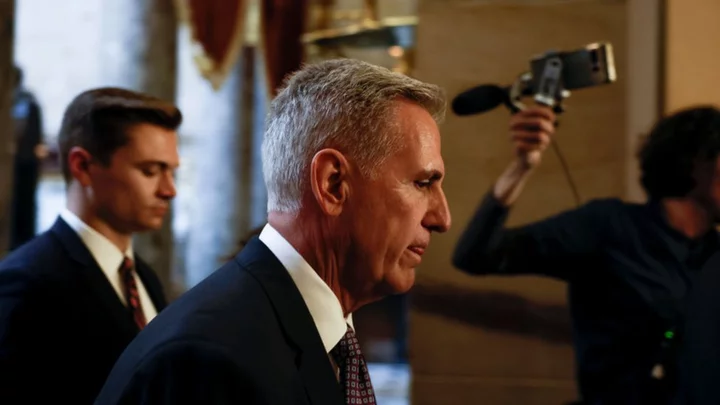
Debt ceiling deal: US House overwhelmingly passes bill
The Senate must approve the deal and send it to the president's desk this weekend to avoid a default.
2023-06-01 10:20
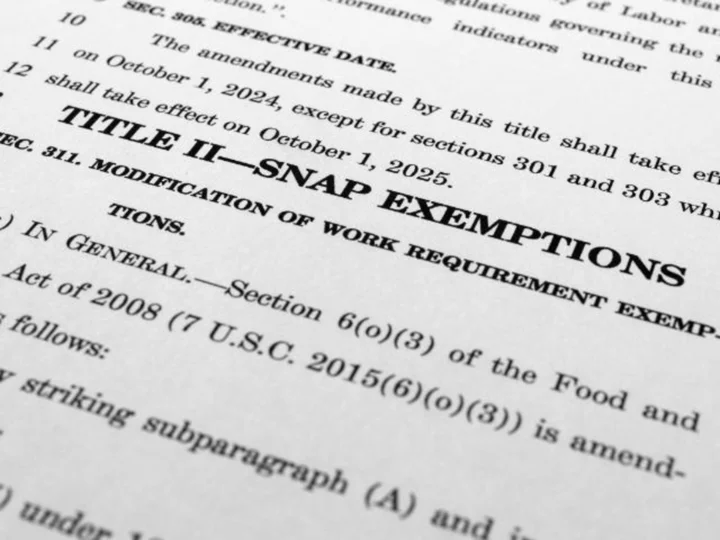
House GOP challenges CBO's analysis of work requirements in debt ceiling bill
House Republicans defended their broadening of work requirements for safety net programs in the debt ceiling bill on Wednesday, saying it would help people escape poverty and assist employers looking to hire.
2023-06-01 05:25
